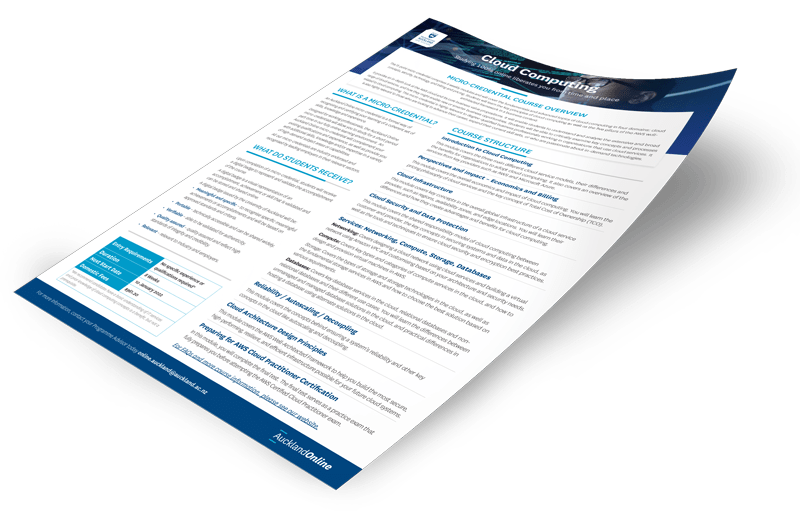

SCIENCE

Cloud Computing for Business Professionals (Online)
Micro-credential
This 15 point micro-credential comprises 8 weekly modules and will cover the fundamentals and advanced topics of cloud computing in four domains: cloud concepts, security, technology, and billing and pricing. Students will learn the key principles of cloud computing as well as the five pillars of the AWS well-architected framework in a business context.
Recommended Background
No specific experience or qualifications required*
University Entrance (or equivalent) required for admission
Only available to NZ citizens and permanent residents
Duration
8 Weeks
Next Start Dates
- 8 July 2024 (Q3)
- 30 Sep 2024 (Q4)
Enrolment closes one week before the course starts.
Apply early to secure your spot.
Domestic Fees
$960**
Course Overview
Cloud Computing for Business Professionals provides an in-depth look at the AWS cloud and its core business value propositions. This postgraduate-level micro-credential will help students enhance their professional credibility in cloud computing. It will enable students to understand and analyse the extensive and broad range of cloud services, and how they might enable new or smarter business opportunities. Students will be able to critically examine key concepts and processes related to cloud computing. This micro-credential is highly relevant to degree-qualified business professionals working in organisations that use cloud services. It is also highly relevant to those who are looking to advance their career, expand their current skill sets, or who are passionate about in-demand technologies.
*We recommend candidates have a basic understanding of IT services and prior knowledge of cloud computing concepts is a benefit, but not a prerequisite.
Business and IT professionals are now expected to have both theoretical understanding and practical skills relating to cloud computing, and potential learners will be business development professionals who sit across the breath of an organisation, including project managers, IT managers, sales managers, decision makers, and marketers, as well as those working in finance, procurement, and legal departments.
Course Brochure
Enter your details to get the Cloud Computing for Business Professionals course brochure instantly emailed to your inbox.

Cloud computing has gained in popularity in recent times with the ability to enable organisations and businesses to distribute their applications to market effectively. It is a powerful platform that provides reliable and scalable computing services such as data storage and business analytics over the Internet. The top cloud provider, Amazon Web Services (AWS), has attracted many businesses to migrate their solutions to the cloud. Cloud computing with AWS has become one of the in-demand technology skills to learn for enhancing employability.
This micro-credential will cover the fundamentals and advanced topics of cloud computing in four domains: cloud concepts, security, technology, and billing and pricing. Students will learn the key principles of cloud computing, which include high availability, automation, decoupling, resilience, scalability, and serverless architectures. This course will also present the five pillars of the AWS well-architected framework in a business context. The five pillars are:
- Operational excellence,
- Security,
- Reliability,
- Performance efficiency, and
- Cost optimization.
Students will learn to evaluate and critique these principles and pillars through understanding the real-world scenarios and through examining their applications in practice.
| Module | Description |
| Introduction to Cloud Computing | This module introduces cloud computing to business professionals. In this module, you will learn the key concepts of cloud computing and the various benefits of cloud computing. You will understand the three main different cloud service models and their differences. You will be able to explain the benefits for organisations to adopt cloud computing. You will also see an overview of the key cloud services from different cloud service providers such as AWS and Microsoft Azure. By the end of this module, you will be able to explain the advantages of organisations adopting cloud computing. |
| Perspectives and Impact – Economics and Billing | This module presents the overall economics and impact of cloud computing. You will understand the pricing philosophy of cloud services and identify the benefits of adopting cloud computing to an organisation. This module also introduces the key concept of Total Cost of Ownership (TCO) and billing of cloud computing. By the end of this module you will be able to explain the economic benefits of cloud computing and be able to provide a calculation of Total Cost of Ownership for adopting cloud computing. |
| Cloud Infrastructure | This module presents key concepts in the overall global infrastructure of a cloud service provider that support cloud services. You will be introduced to ideas such as regions, availability zones, and edge locations. You will be able to explain their differences and also understand how they create advantages and benefits for cloud computing. By the end of this module, you will be able to understand the overarching benefits of the cloud and its services and how its underlying infrastructure enables cloud providers to create these benefits. |
| Cloud Security and Data Protection | This module presents the shared responsibility model of cloud computing and the various key concepts in securing systems and data in the cloud. You will understand the different responsibilities of the customer and the cloud service provider. You will also understand the tools and techniques provided in order to ensure cloud security. By the end of this module you will be able to have a good understanding of all the important aspects of securing the cloud through tools and encryption best practices. |
| Services – Networking, Compute, Storage, Databases |
Networking: Compute: Storage: Databases: |
| Reliability / Autoscaling / Decoupling | This module presents the key concept of reliability and the different levels of system reliability in a cloud-based system. You will learn about the factors and system design choices that affect the reliability of a cloud system and the choices you will be presented with when designing systems in the cloud. You will also be able to identify and describe a cloud system in terms of their reliability, availability, and fault tolerance. By the end of this module, you will be able to understand the concepts behind ensuring a system’s reliability and also learn about key concepts in the cloud like autoscaling and decoupling. |
| Cloud Architecture Design Principles | This module presents the AWS Well-Architected Framework with the five pillars of excellence to act as a guide to help you build the most secure, high-performing, resilient, and efficient infrastructure possible for your cloud systems. By the end of this module, you will be able to follow through these design principles and ensure your future cloud systems follow industry best practices. |
| Preparing for AWS Cloud Practitioner Certification | In this module, you will complete the final test. The final test serves as a practice exam that helps you to be fully prepared before attempting the AWS Certified Cloud Practitioner exam. The resources listed in the module will help you understand what to expect. |
Upon completion of the course, students will be able to:
- Assess the value and benefit of cloud computing services in the context of small to medium business organisations
- Identify different business cases for cloud solutions in their domains of expertise
- Propose cloud solutions by applying appropriate architectural principles and practices in cloud computing services
- Critically examine industry proposed cloud architectures with practice- and research- informed literature
- Create event-driven scaling solutions to architect cloud platform solutions
- Demonstrate the application of advanced cloud computing techniques through designing architectures to decouple infrastructure and reduce inter-dependencies
Upon successful completion of the course you will:
- Be awarded with 15 credit points from the University of Auckland
- Be issued with a digital badge from the University of Auckland which you can share across your digital profiles like LinkedIn
- Be equipped to earn the industry recognised AWS Cloud Practitioner certification, which provides the scaffolding required for a more in-depth career in cloud computing. You will receive a voucher valued at $100, to sit the AWS certification at an accredited AWS test centre.
Cloud computing has gained in popularity in recent times with the ability to enable organisations and businesses to distribute their applications to market effectively. It is a powerful platform that provides reliable and scalable computing services such as data storage and business analytics over the Internet. The top cloud provider, Amazon Web Services (AWS), has attracted many businesses to migrate their solutions to the cloud. Cloud computing with AWS has become one of the in-demand technology skills to learn for enhancing employability.
This micro-credential will cover the fundamentals and advanced topics of cloud computing in four domains: cloud concepts, security, technology, and billing and pricing. Students will learn the key principles of cloud computing, which include high availability, automation, decoupling, resilience, scalability, and serverless architectures. This course will also present the five pillars of the AWS well-architected framework in a business context. The five pillars are:
- Operational excellence,
- Security,
- Reliability,
- Performance efficiency, and
- Cost optimization.
Students will learn to evaluate and critique these principles and pillars through understanding the real-world scenarios and through examining their applications in practice.
| Module & Description |
|
Introduction to Cloud Computing This module introduces cloud computing to business professionals. In this module, you will learn the key concepts of cloud computing and the various benefits of cloud computing. You will understand the three main different cloud service models and their differences. You will be able to explain the benefits for organisations to adopt cloud computing. You will also see an overview of the key cloud services from different cloud service providers such as AWS and Microsoft Azure. By the end of this module, you will be able to explain the advantages of organisations adopting cloud computing. |
|
Perspectives and Impact – Economics and Billing This module presents the overall economics and impact of cloud computing. You will understand the pricing philosophy of cloud services and identify the benefits of adopting cloud computing to an organisation. This module also introduces the key concept of Total Cost of Ownership (TCO) and billing of cloud computing. By the end of this module you will be able to explain the economic benefits of cloud computing and be able to provide a calculation of Total Cost of Ownership for adopting cloud computing. |
|
Cloud Infrastructure This module presents key concepts in the overall global infrastructure of a cloud service provider that support cloud services. You will be introduced to ideas such as regions, availability zones, and edge locations. You will be able to explain their differences and also understand how they create advantages and benefits for cloud computing. By the end of this module, you will be able to understand the overarching benefits of the cloud and its services and how its underlying infrastructure enables cloud providers to create these benefits. |
|
Cloud Security and Data Protection This module presents the shared responsibility model of cloud computing and the various key concepts in securing systems and data in the cloud. You will understand the different responsibilities of the customer and the cloud service provider. You will also understand the tools and techniques provided in order to ensure cloud security. By the end of this module you will be able to have a good understanding of all the important aspects of securing the cloud through tools and encryption best practices. |
|
Services – Networking, Compute, Storage, Databases Networking: Compute: Storage: Databases: |
|
Reliability / Autoscaling / Decoupling This module presents the key concept of reliability and the different levels of system reliability in a cloud-based system. You will learn about the factors and system design choices that affect the reliability of a cloud system and the choices you will be presented with when designing systems in the cloud. You will also be able to identify and describe a cloud system in terms of their reliability, availability, and fault tolerance. By the end of this module, you will be able to understand the concepts behind ensuring a system’s reliability and also learn about key concepts in the cloud like autoscaling and decoupling. |
|
Cloud Architecture Design Principles This module presents the AWS Well-Architected Framework with the five pillars of excellence to act as a guide to help you build the most secure, high-performing, resilient, and efficient infrastructure possible for your cloud systems. By the end of this module, you will be able to follow through these design principles and ensure your future cloud systems follow industry best practices. |
|
Preparing for AWS Cloud Practitioner Certification In this module, you will complete the final test. The final test serves as a practice exam that helps you to be fully prepared before attempting the AWS Certified Cloud Practitioner exam. The resources listed in the module will help you understand what to expect. |
Upon completion of the course, students will be able to:
- Assess the value and benefit of cloud computing services in the context of small to medium business organisations
- Identify different business cases for cloud solutions in their domains of expertise
- Propose cloud solutions by applying appropriate architectural principles and practices in cloud computing services
- Critically examine industry proposed cloud architectures with practice- and research- informed literature
- Create event-driven scaling solutions to architect cloud platform solutions
- Demonstrate the application of advanced cloud computing techniques through designing architectures to decouple infrastructure and reduce inter-dependencies
Upon successful completion of the course you will:
- Be awarded with 15 credit points from the University of Auckland
- Be issued with a digital badge from the University of Auckland which you can share across your digital profiles like LinkedIn
- Be equipped to earn the industry recognised AWS Cloud Practitioner certification, which provides the scaffolding required for a more in-depth career in cloud computing. You will receive a voucher valued at $100, to sit the AWS certification at an accredited AWS test centre.
Frequently Asked Questions about this micro-credential
Application FAQs
What are the entry requirements?
Whilst no specific experience or qualifications are required, prior knowledge of cloud computing concepts is a benefit. We recommend candidates have a basic understanding of IT services. Please note that for admission you must meet the requirements to study at a New Zealand University (e.g. through University Entrance or an alternative entrance pathway).
What are the exact dates for the next intake?
The next intake dates are listed at the top of the page.
Is the course fee a once-off lump sum?
Yes, the course fee is a once off sum of $960 for domestic students.
Can I pay for my micro-credential through StudyLink?
Is this micro-credential open to non-resident students?
No. Currently our micro-credentials are only open to NZ citizens and permanent residents.
Studying FAQs
Can I study the course in my own time?
You can study at a time that suits you (within the allocated course dates). Auckland Online courses have been designed to be flexible yet structured to help you gain the knowledge in the time you have.
How is the course structured?
The course will run over 8 weeks, and will comprise of weekly modules, essentially 1 module per week. Further details on the course structure can be found under the ‘Course Structure’ tab further up on this page.
Can I study the course whilst working full-time?
Yes, our courses are designed for working professionals and are structured to be flexible yet structured to help you gain the knowledge in the time you have.
Assessment FAQs
How will I be assessed?
You will be assessed through case studies, weekly quizzes and a final test.
Benefits FAQs
All our micro-credentials are credit bearing, so that you can progress your studies further towards a degree qualification. Please note, credits will need to be relevant to the programme you wish to study and satisfy the programmes specific entry requirements.
How many course credits will I attain upon completion of the course?
Upon completion of the course, you will be awarded with 15 credit points from the University of Auckland.
Do I get a certificate at the end? Will it reflect ‘online micro-credential’?
Upon completion of the course, you will be issued with a digital badge from the University of Auckland which you can share across your digital profiles like LinkedIn.
How does the AWS exam work?
Successful learners will also be equipped to take the industry recognised AWS Cloud Practitioner certification. The AWS Cloud Practitioner certification, is not a condition to complete the course, but rather an extra value-add to you to purpose this certification using the body of knowledge you’ve acquired from taking this course. Each student who passes the course, will be given a voucher valued at $100, to sit the AWS certification at an accredited AWS test centre.
What employers or professional associations have endorsed the value and industry relevance of the learning outcomes of this micro-credential?
NZTech
Industry Advisory Group, Auckland ICT Graduate School
**Fees are inclusive of 15% GST, but do not include the Student Services Fee, course books, travel and health insurance, or living costs. Amounts shown are indicative only. In addition to the tuition fee, there is a Student Services Fee of $4.44 per point (online). Fees will be confirmed upon completion of enrolment into courses.
Cloud Computing for Business Professionals – Enrol Now
After submitting this form you will receive an email with the next steps required for you to enrol in this University of Auckland short online part-time micro-credential.
We collect your contact details so we can send you information about studying at the University of Auckland. Please read our Privacy Policy for more information.
Engineering Contracts for Project Managers: Upskill your Career in your Own Time
In a previous blog post, we outlined why a sufficient knowledge of construction-specific contract law is essential to being a successful project manager and/or industry professional. The University of Auckland Engineering School in partnership with...
Build your Engineering Project Management Career: Why Contract Law is a Must-Have Skill
Contracts are the foundation of any engineering project: outlining the rights, obligations, and responsibilities of all parties involved. Well-structured and well-understood contracts provide clarity, ensure accountability, and minimise the potential for lengthy and costly disputes.
Which Project Management Methodology is Best for Your Cross-Functional Team?
Starting a new project? Agile, waterfall, and Kanban are three popular project management methodologies used in organizations. Each has its own strengths and weaknesses, and their suitability for cross-functional projects may vary.




